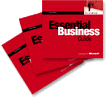

 | |
 |
 Research and developmentDeveloping new products for your existing customersThe world of business doesn't stand still, says Alan Rae. The market is always changing and any market opportunity has only got a certain shelf life.
What do people do in practice? Research shows that three times as many companies try to find new markets for their existing products than look at developing new products for their existing customers. This is really making life more difficult than it needs to be. The key thing to focus on is how much it costs to acquire a customer. Research shows it costs 7 - 10 times as much to create a new customer as it does to sell to an existing one. Four stagesSo we can conclude that it's often cheaper and better to find or develop new products for your existing customer base than to conquer new markets. Why, then, are companies so reluctant to do this? Partly, I think, because they are wedded to their own babies, partly because they are reluctant to dilute their brand with other people's products and partly because they are unsure about how to develop new products in a systematic way. In essence, new product development is a four-stage process:
The actual product that the customer buys is often a joint creation between someone knowledgeable in their team and someone on ours who can see a bit beyond the current offerings. All we have to do is to make this more systematic. Start by picking a mixture of customers - say two large ones, two adventurous ones and a couple you don't know well. Have a chatRing them up and say you're looking at how you can improve the quality of what you supply to them and ask to have a chat. You can do this on the phone but it's better to go and see them because you will pick up ideas that you won't get by doing it remotely.
I've been at this since 1977 - experience teaches that ideas come out of conversation, and if the conversation is held at the point of use, so much the better. If you do it yourself as the business owner, they will nearly always see you. Devise a checklist for yourself of the items that you want to cover - 6 to 8 areas are enough - then just go and talk to them. See what comes up; are there any common themes? Afterwards, sit with your colleagues. Brainstorm around the ideas and filter them according to how easy the idea is to do, how big the potential market is, and how well it fits with you existing positioning and branding. Devise a shortlist and telephone a sample of your customer base. If you have 50 customers, ring them all up. If you have thousands, then talk to a representative sample. Pick two possibilities - develop one and buy in a complementary product for the other to kick-start the process. Focus on the customer's needs - particularly how they use your product - you may get some surprises. Then talk about how you could develop the product or service - new materials, new processes, and new features to deliver some real benefit to the customer. If you make the most of your existing customer relationships to clarify what your customers expect or want from you, you may save yourself a fortune prospecting in new markets that don't know or trust you. 
Book Recommendations
|